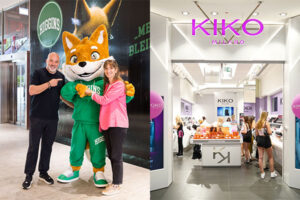By Caroline von Westerholt, 21Media
As the first digital generation, Generation Z intuitively uses online channels to communicate, and it, almost independently, sets new trends, markets products, and has a great deal of influence on older generations, especially Millennials. Therefore, it is crucial for brick-and-mortar stores to engage Generation Z, not only to attract them as new customers, but also to positively lobby older generations to come back to our stores.
The example of 25-year-old Kylie Jenner alone, who forced Instagram to retract planned usage changes by posting her dislike, is an unprecedented example of the overwhelming power of native digital Generation Z. However, it is not just superstars with millions of followers who are in a position to have great influence. One need only take a look at Fridays for Future or the body positivity movement. It has changed our view of the ecosystem, made us rethink our eating habits, and even banned skinny jeans from the wardrobes of Generation Y and older.
Source of Power
It is important for everyone in our industry to understand where and how Generation Z is gaining so much power. The answer lies in the filigreed mixture of their high moral standards and the natural act of expressing themselves via social media.
Digitalization has triggered a massive shift in the habits associated with self-expression. Generation Z has an innate digital instinct. While older generations use social media to, shall we say, “show off”, for Generation Z it is a way to express themselves in a way that deeply reflects their personalities. They are not just the generation most present on social media: They live social media, they are social media, and they massively influence social media.
Moral Standards
They also have the highest moral standards. The younger generation values secondary factors such as style, product presentation, sustainability, and moral perfection. They challenge brands and stores by demanding social responsibility, equality, and innovation. While Millennials were virtually brand addicts, morality and individuality now far surpass brand affinity.
Older generations that use or are just discovering social media are inundated with emotional self-expression that is morally impeccable. Who could resist being influenced by that? This is precisely where the great power of Generation Z begins.
They are a generation of natural influencers, constantly sowing the seeds of moral standards and newly discovered trends on social media channels. Since they are the largest group that generates content on social media, they have a huge impact on the content we encounter on a daily basis.
How to Benefit from Gen Z
For brick-and-mortar retail to benefit from Generation Z’s natural ability to influence, the goal must be to become an attractive and popular shopping routine in the minds, and even more so in the hearts, of Generation Z.
“They are not just the generation most present on social media: They live social media, they are social media, and they massively influence social media.”
The latest studies on Gen Z behavior show that they are more likely to shop physically than Millennials, but only if their expectations are met. They expect stores to offer highly customized or unique products, fashion, and accessories. They also support mainstream brands, but only in combination with a sense of self-determination. The physical shopping process must be accompanied by a constant stream of adventures that respond to fast-moving influences. Of course, the brands and real estate must abide by the rules of corporate and social responsibility.
Within the confusing and fast-moving reality of Gen Z, brands have to communicate even more strongly who they are and the benefits they offer. A truly established brand story, communicated via strategically well-developed (Gen Z) influencer marketing, is more important than ever before.
In my opinion, strategic influencer marketing in the retail real estate sector is still in its infancy or is done in a rather uncoordinated way. Authors Nirschl & Steinberg have identified some ways of balancing the six most important success factors.
- Range (mass vs. niche)
- Relevance (fit between influencer and brand / fit between target group and community)
- Reputation (influencer authenticity)
- Resonance (community feedback)
- Target Definition (clear vision, targets, goals, and clear campaigning content)
- Target Group (detailed digital target group analysis, forming a clear customer profile)
Nirschl & Steinberg highlight the importance of doing your homework before launching an influencer campaign in order to avoid wasting a lot of money on mismatched influencers and target audiences.
Before this becomes a scientific paper, my conclusion is as follows: In terms of marketing, Gen Z is probably the most influential customer group ever. Brick-and-mortar retailers can benefit greatly from this digitally native generation if they take their wants and needs seriously and address them wisely. They will thank you by influencing your business in a natural way with Gen Z and older generations.
Defining Generation Gen Z:
Generation Z, or Gen Z for short, is the demographic cohort that succeeds Millennials and precedes Generation Alpha. Researchers and popular media use the mid-to-late 1990s as the starting birth years and the early 2010s as the ending birth years. Typical characteristics include: diversity is their norm, they are our first “digital natives”, they are pragmatic and financially-minded, many factors contribute to their mental health challenges, they are shrewd consumers and they are politically progressive.

is Head of Strategy & Repositioning of Retail Properties at Twenty One Media GmbH






